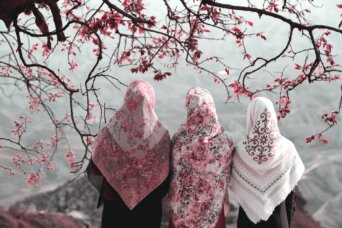- About
- Topics
- Story
- In-Depth
- Picks
- Opinion
- News
- Donate
- Signup for our newsletterOur Editors' Best Picks.Send
Read, Debate: Engage.
| topic: | Islamophobia |
|---|---|
| located: | India |
| editor: | Tish Sanghera |
In the southern state of Karnataka, six women protesting their right to wear a hijab in India’s schools went viral on social media last week, launching the debate around religious liberties and islamophobic discrimination.
In one photo the girls are shown sitting on the steps outside of their classrooms, allegedly banned from entering unless they remove their head coverings. In another video, we see the school gates being closed on the girls, barring them from entering at a crucial time, just months away from the national exams that will decide their futures.
School officials say the girls’ parents had signed a form upon joining the college, agreeing that students would abide by the uniform policy. Officials state that the hijab is not an item of uniform, and therefore should not be worn in the classroom.
However certain politicians, lawyers and academics claim the girls are being targeted for their faith, an example of how Muslim religous symbols are increasingly disallowed, even when those of other faiths permitted. Shashi Tharoor, a Congress Party MP from the neighbouring state of Kerala, highlighted that unlike France, for instance, India has no laws banning displays of religion. “It's been a strength of India that everyone is free to wear what they want,” he tweeted, adding “if the hijab is disallowed, what about the Sikh turban? The Hindu's forehead mark? The Christian's crucifix? This college is going down a slippery slope. Let the girls in. Let them study. Let THEM decide.”
Legal critics are also warning of the illegality of the school’s actions and that the girls’ exclusion is a slippery slope towards the denial of their rights in other parts of society. “You may not like a religious symbol but that cannot become a reason to exclude a community from accessing public institutions. These are essential religious symbols, like the turban and beard are for Sikhs. This [dictate] is totally illegal,” said Kawalpreet Kaur, a lawyer with the Human Rights Law Network.
After an organisation of Muslim students active in South India met with the school urging them to allow the girls to continue their studies, they declared the school and district authorities were under pressure from the state government to deny the girls their rights.
Karnataka is currently governed by the Bharatiya Janata Party (BJP), the right wing, Hindu-nationalist party led by Prime Minister Modi. In recent years the party’s followers have inflamed communal tension and there are fears that society is increasingly fractured along religious lines. In recent months, Hindu fundamentalist groups attacked Christian missionaries over false accusations around undertaking ‘forced conversions’.
After groups wearing saffron shawls organised a counter-protest on Saturday, marching into school wearing the signature colour of the BJP, it is clear the hijab-ban is becoming increasingly political. But while political leaders may be sensing an opportunity to pit communities against each other, we must not forget that six young girls are losing their opportunity for education.
Photo by Hasan Almasi

